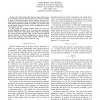Free Online Productivity Tools
i2Speak
i2Symbol
i2OCR
iTex2Img
iWeb2Print
iWeb2Shot
i2Type
iPdf2Split
iPdf2Merge
i2Bopomofo
i2Arabic
i2Style
i2Image
i2PDF
iLatex2Rtf
Sci2ools
INFOCOM
2007
IEEE
2007
IEEE
Fundamental Complexity of Optical Systems
Abstract—It is often claimed that future systems will necessarily be all-optical, because electronic devices are not fast enough to keep up with the increase in fiber capacity. However, two objections are commonly raised: first, optical systems need many basic optical components, which are typically very expensive; and second, optical systems need many switch reconfigurations, which are typically very slow. In this paper, we examine whether these two costs can be fundamentally bounded. First, we develop the equivalence between coding theory and optical system design by introducing the concept of super switches. Then, we show how the minimal expected number of switch reconfigurations is almost equal to the state space entropy of the optical system. Finally, we point out the trade-off between the two types of costs.
Basic Optical Components | Communications | INFOCOM 2007 | Optical System | Switch Reconfigurations |
Related Content
| Added | 03 Jun 2010 |
| Updated | 03 Jun 2010 |
| Type | Conference |
| Year | 2007 |
| Where | INFOCOM |
| Authors | Hadas Kogan, Isaac Keslassy |
Comments (0)

